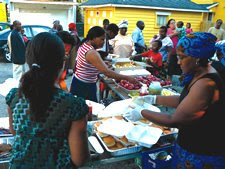by Daniela Martinez MorenoAFSC Special Projects FellowRepresentative Maxine Waters (D-CA) expressed concerns about E-Verify: "I question all of these systems," said Representative Waters. "I question whether or not we really know whether or not there is a 0.5 percent error or a 4 percent error in the E-Verify system."
On June 10, the House Judiciary
Immigration, Citizenship, Refugees, Border Security, and International Law Subcommittee held a
hearing on the Electronic Employment Verification System, also known as "
E-Verify." The system uses information in databases maintained by the Department of Homeland Security (DHS) and the Social Security Administration (SSA) to check an individual's employment eligibility.
Representative Zoe Lofgren (D-CA), Chair of the Immigration Subcommittee, expressed concerns about the system's faulty database and the potential effects of making E-Verify mandatory for all employers. The SSA's Office of the Inspector General
reports that 4.1 percent of its records contain discrepancies related to name, date of birth, or citizenship status, with 12. 7 million of those records pertaining to individuals born in the United States.
Rep. Lofgren highlighted Traci Hong's
story. Hong serves as Rep. Lofgren's Legislative Counsel. When a government agency used E-verity to check Hong's work eligibility, Hong made "six separate trips" to the personnel office and to SSA to prove that she was a naturalized U.S. citizen. Navigating the system proved difficult for Hong, an immigration lawyer. "Others might have given up," said Rep. Lofgren
(USA Today).Half a Percent Goes a Long Way
Although Representative Heath Shuler (D-NC)
argued that the error rate in E-Verify is "only 0.5 percent", House members pointed out that a 4.1 percent error rate in the SSA database translates to 17.8 million errors that could affect an employee's work eligibility. Subcommittee members raised questions about Representative Shuler's legislation, the Secure America Through Verification and Enforcement Act (SAVE Act,
H.R. 4088), which would mandate the use of E-Verify by all employers.
Proponents of Employment Verification at Odds
Representatives Sam Johnson (R-TX) and Gabrielle Giffords (D-AZ), cosponsors of the New Employee Verification Act (NEVA,
H.R. 5515) were also amongst the list of witnesses questioned by House Immigration Subcommittee members. NEVA
mandates the creation of a new Secure Electronic Employment Verification System (SEEVS) that would use the SSA database to verify employment eligibility for U.S. citizens or nationals, and DHS information to verify employment eligibility for non-U.S. citizens.
According to Representative Giffords, "In Arizona, E-Verify is carrying into virtually all other aspects of life. Media outlets report instances of racial profiling and discrimination on the part of employers." Arizona became the first state to mandate the use of E-Verify for all its employers.
However, Representative Maxine Waters (D-CA) expressed concerns that NEVA still mandates the use of the faulty SSA database. "I question all of these systems,"
said Representative Maxine Waters. "I question whether or not we really know whether or not there is a 0.5 percent error rate, or a 4 percent error rate," Rep. Waters said.
House Members Apprehensive About Potential DiscriminationRepresentative John Conyers (D-MI), Chairman of the House Judiciary Committee,
expressed concerns that "for many employers, it will be easier to just not hire employees with 'unusual' names or who appear foreign."
Members of the Immigration Subcommittee are also wary about the potential effects of E-Verify on employer discrimination. A September 2007
evaluation on E-Verify conducted by
Westat, a research agency for the U.S. government, revealed that "31 percent of employers reported using E-Verify to verify employment eligibility before the employee's first day of paid work." E-Verify prohibits registered employers from using the program for pre-employment screening of job applications.
Despite Growing Concerns, Administration Moves Ahead with E-VerifyDespite discussions in Congress about the dangers of making E-Verify mandatory for all employers, on June 9 President George Bush
amended Executive Order 12989 to mandate the use of the electronic employment verification system for all federal contractors. DHS has
designated E-Verify as the electronic employment eligibility verification system that all federal contractors must use to comply with Executive Order 12989.
AFSC is troubled with this development and encourages the public to call for the laying down of E-verify. This proposed 'will have a negative impact on the rights of workers, and civil the liberties and labor rights of immigrants and non-immigrants alike. E-verify do not resolve the realities of a broken immigration system which has not kept pace with global changes, economic shifts or the root causes of migration.








